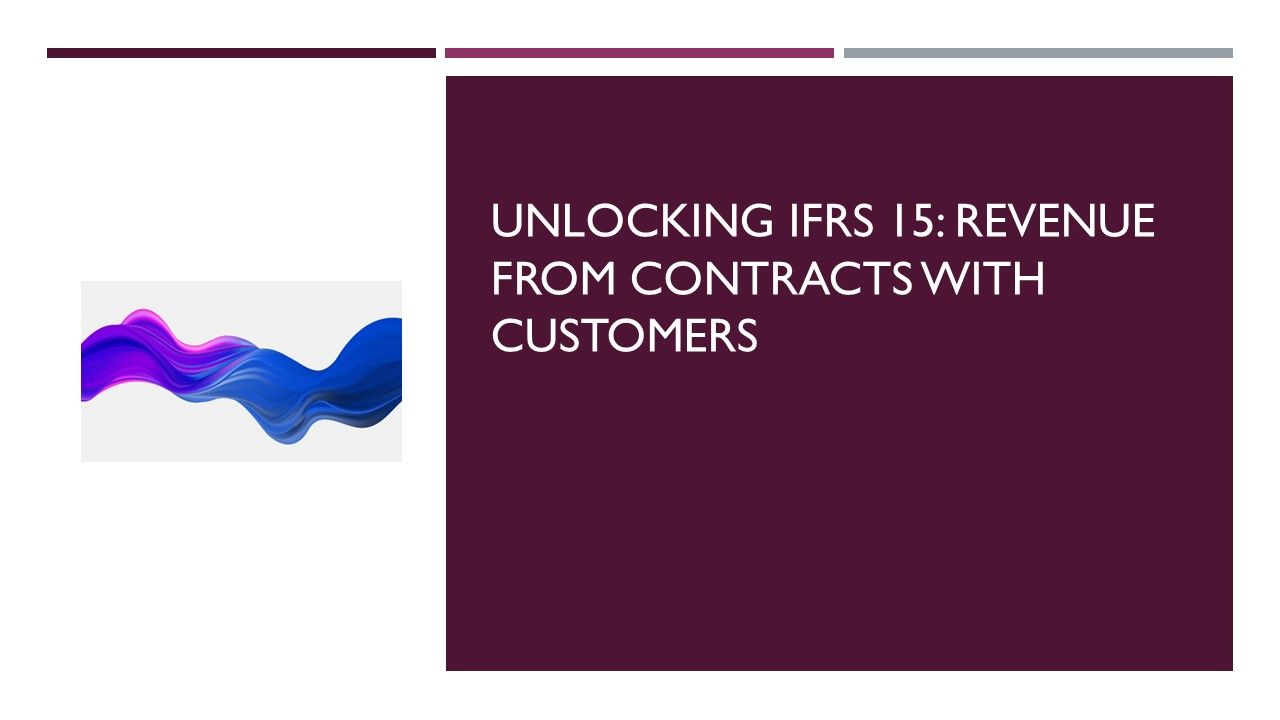What is IFRS 15?
Jun 20, 2024
What is IFRS 15?
Welcome to the world of IFRS 15, where revenue recognition takes center stage in the financial reporting landscape.
In today's fast-paced business environment, understanding revenue from contracts with customers is crucial for maintaining transparency and integrity in financial reporting. IFRS 15, the standard governing this aspect, provides a robust framework that ensures revenue is recognized consistently and accurately across various industries. In this blog post, we'll delve into the essentials of IFRS 15, exploring its significance, core principles, and practical application in the business world.
IFRS 15, issued by the International Accounting Standards Board (IASB), establishes comprehensive guidelines for revenue recognition from contracts with customers. Its primary objective is to provide a clear and consistent model for reporting revenue, thereby enhancing comparability across different sectors and jurisdictions.
The standard applies to all entities that enter into contracts to deliver goods or services to customers, regardless of the industry or business model. It replaces several older standards and interpretations, streamlining the process and creating a unified approach to revenue recognition.
The Five-Step Model of IFRS 15
At the heart of IFRS 15 lies a five-step model designed to guide entities through the revenue recognition process. This model ensures that revenue is recognized in a manner that reflects the transfer of promised goods or services to customers.
-
Identify the Contract with a Customer:
- Recognize and define the contractual agreement between the entity and the customer. Contracts can be written, verbal, or implied by customary business practices.
-
Identify the Performance Obligations:
- Determine the distinct goods or services promised in the contract. Each performance obligation must be separately identifiable and capable of being fulfilled independently.
-
Determine the Transaction Price:
- Establish the total amount of consideration the entity expects to receive in exchange for transferring the goods or services. This includes variable considerations and any constraints on estimates.
-
Allocate the Transaction Price:
- Distribute the transaction price to each performance obligation based on their relative standalone selling prices. This ensures that revenue is allocated fairly and accurately across the contract.
-
Recognize Revenue When (or As) Performance Obligations Are Satisfied:
- Revenue is recognized when the entity fulfills its performance obligations, either over time or at a specific point in time, depending on the nature of the goods or services provided.
Why is IFRS 15 Important?
IFRS 15 is pivotal for several reasons:
- Consistency and Transparency: It ensures uniformity in revenue recognition practices, promoting transparency and comparability across financial statements.
- Enhanced Disclosures: The standard mandates comprehensive disclosures, providing stakeholders with better insights into an entity's revenue sources and patterns.
- Risk Management: By aligning revenue recognition with the actual transfer of control to the customer, IFRS 15 mitigates risks associated with premature or inaccurate revenue reporting.
Practical Application of IFRS 15
Implementing IFRS 15 involves more than just adhering to accounting rules; it requires a deep understanding of the business and its contractual arrangements. Here are some practical considerations:
- Contract Analysis: Thoroughly review and analyze contracts to identify performance obligations and determine the appropriate timing for revenue recognition.
- System Updates: Ensure that your accounting systems and processes are updated to accommodate the new revenue recognition criteria and disclosure requirements.
- Training and Education: Equip your finance team with the knowledge and skills needed to apply IFRS 15 effectively, ensuring accurate and compliant financial reporting.
Challenges and Considerations
While IFRS 15 brings numerous benefits, it also presents challenges:
- Complex Contracts: Identifying performance obligations in complex, multi-element contracts can be intricate and time-consuming.
- Variable Consideration: Estimating variable consideration, such as discounts, rebates, and performance bonuses, requires careful judgment and a robust estimation process.
- Impact on Financial Metrics: Changes in revenue recognition timing can affect key financial metrics and performance indicators, necessitating clear communication with stakeholders.
Conclusion
IFRS 15 represents a significant advancement in revenue recognition standards, fostering greater clarity and consistency in financial reporting. By understanding and applying its principles, entities can enhance their transparency, manage risks, and provide valuable insights into their revenue-generating activities.
Whether you're a seasoned professional or new to the world of accounting, mastering IFRS 15 is essential for staying ahead in today's dynamic business environment. Unlock the potential of accurate and reliable revenue reporting with IFRS 15 and take your financial expertise to the next level.
Lorem ipsum dolor sit amet, consectetur adipiscing elit. Cras sed sapien quam. Sed dapibus est id enim facilisis, at posuere turpis adipiscing. Quisque sit amet dui dui.
Stay connected with news and updates!
Join our mailing list to receive the latest news and updates from our team.
Don't worry, your information will not be shared.
We hate SPAM. We will never sell your information, for any reason.

